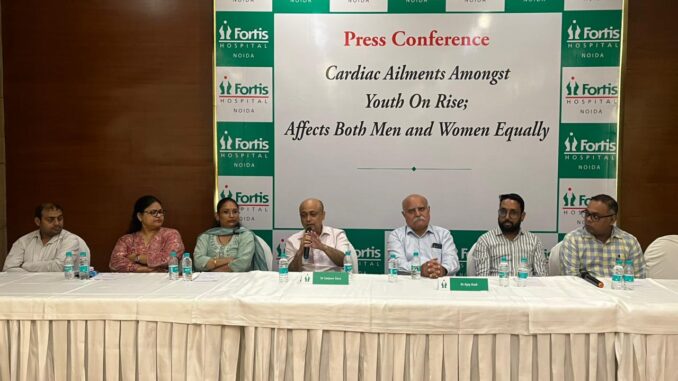Noida, 26 September 2024: Heart attacks were previously believed to affect only older individuals, but now they are affecting the younger generation, particularly between the age group of 30 and 40. Heart disease is a significant cause of death worldwide and its prevalence has risen in India over the past five years. This rise in sudden cardiac arrests and other cardiac related ailments can be mostly attributed to our fast-paced, erratic and unhealthy lifestyle. Doctors at Fortis Hospital, Noida highlighted this disturbing trend and narrated instances of young cardiac patients who had suffered sudden cardiac arrest, at a press briefing held at the hospital today.

Dr Ajay Kaul, Chairman, Cardiac Sciences, Fortis Hospital, Noida said, “In recent years, India has been witnessing a troubling surge in the occurrences of heart disease among its younger population, particularly among individuals in their 30s and 40s. Traditionally, heart disease has been perceived as a condition affecting only older adults. However, recent research has directed at a disturbing shift, with a growing number of younger Indians experiencing heart attacks and other cardiovascular conditions. This paradigm change can largely be attributed to lifestyle modifications characterized by poor dietary habits, sedentary lifestyles, and escalating stress levels. Given the escalating trajectory of cardiovascular diseases among young adults, early screening for hypertension, diabetes, and dyslipidemia (abnormal lipid levels in the blood) emerges as imperative. Timely detection through routine health check-ups can pave the path for enhanced management and treatment of these conditions, potentially mitigating the risk of heart disease.”
Dr Sanjeev Gera, Director & HOD, Cardiology, Fortis Hospital Noida said, “We are witnessing around 70-80 cases of cardiac related ailments on a yearly basis. Recently, we treated a few young patients in the age group 30-40 years and all of them had symptoms of chest pain. Soon after admission to the hospital, they were thoroughly evaluated and given immediate treatment. The patients responded well to treatment and are now leading a normal life. Stress and sedentary lifestyles are key factors leading to a rise in cardiac diseases in younger population.”
Present at the media briefing were patients who had suffered sudden cardiac arrests and were treated at Fortis Hospital Noida. The first such case was a 37-year-old woman who was admitted at Fortis Noida’s emergency department with chest discomfort for one week. The medical evaluations indicated heart attack and a coronary angiography was done which showed blocked arteries. She was treated with a new technology known as DCB (Drug Coated Balloon) to avoid stent or metal in her body. Post the surgery, the patient recovered and was discharged in 3 days in a stable condition.
Second such case was of a 36-year-old man who was presented at the hospital with heart attack and two blocked arteries. He did not have any previous risk factors associated with smoking but had a family history of heart disease. He was treated with the help of stent and Drug Coated Balloon, which was done to avoid metal in his body. Post the surgery, he was discharged in 2 days in a stable condition.
Third case was of a 46-year-old woman who was presented with a major heart attack and underwent an angioplasty and placement of stent to main left anterior descending coronary artery and a Drug Coated Balloon to other artery which is a new technique to avoid stents in younger patients. Her heart function improved immediately after the surgery, and she was discharged in 3 days.
Fourth case was of a 39-year-old man who was presented in the hospital with complaint of chest pain and shortness of breath on exertion. He underwent a coronary angiography, which revealed coronary artery disease – a common heart condition that occurs when the arteries supplying blood to the heart become narrowed or blocked by plaque buildup. He underwent a Coronary Artery Bypass Graft Surgery (CABG) and after 10 days, he was discharged in a stable condition.
Fifth case was of a 34-year-old man who had visited the hospital with complaints of chest pain and shortness of breath on exertion, which was gradually increasing with each passing day. He had an episode of cardiac issue and angiography was done in 2019 and again in February 2024 his coronary, which revealed Triple Vessel Disease. He was advised for Coronary Artery Bypass Graft Surgery (CABG), post which he recovered gradually.


+ There are no comments
Add yours